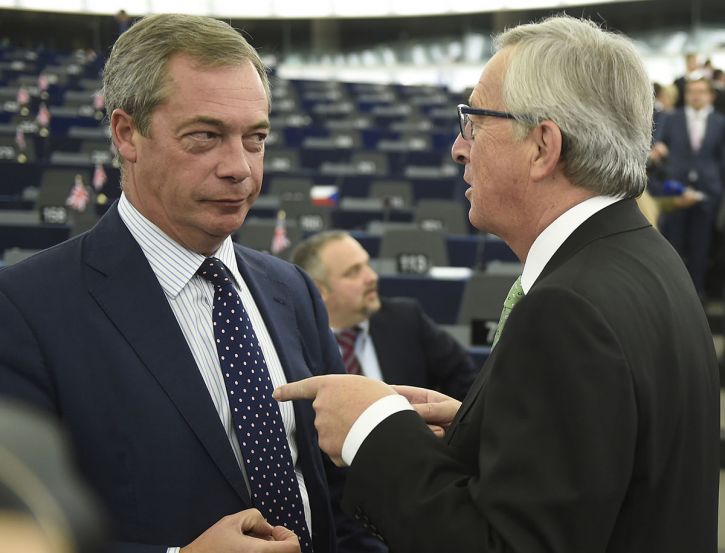EU vs. Europeans: Inside Today’s Battle for Europe
A number of challenges to Europe have led to many Europeans rejecting “the European dream” and turning inward. Where will this battle for Europe lead?
Nigel Farage and Jean-Claude Juncker represent two opposite views on the future of Europe.
No, there is not a literal war being fought in Europe. But there is a very real ideological and political battle being fought throughout the Continent. Though there are multiple positions, the two major sides come down to this divide: Should the nations of Europe continue to unify and integrate (politically, economically and militarily) under the infrastructure of the European Union (EU)? Or should they reverse the efforts to unify and return to nation-states as their primary political identity?
The stakes couldn’t be higher. Within the past five years, Europe has dealt with four major challenges that have shaken it to its core: the debt crisis in southern Europe, the growing threat of an aggressive Putinist Russia to the east, the refugee crisis, and Islamic terrorism. Europeans must decide what is the most effective way to deal with these threats. These challenges have actually created a fifth problem: The rise of what has become known as “Euroscepticism” and nationalism within the individual nations of Europe.
Let’s take a closer look at this fight over the future of Europe.
The Europhiles: More Europe, less nation
The Europhiles represent the status quo position in today’s war in Europe. This side believes the best course for Europe is to stay together and continue to integrate more closely to solve the challenges Europe faces. This position is held by such prominent European leaders as Jean-Claude Juncker, Angela Merkel and François Hollande—but it is increasingly becoming unpopular among the masses of Europe.
Europhiles see nationalism as the force that has caused the wars that have plagued Europe, particularly the two World Wars of the 20th century that killed millions and left a continent in rubble. Instead of retreating to nationalism, they see Europe being stronger and safer with its nations tightly knit together in a federal union.
European Commission president Jean-Claude Juncker recently made the head-turning statement that national borders “are the worst invention ever made by politicians.” It was a comment on the increasing pressure the nations of Europe feel to tighten their borders in response to the Syrian migrant crisis. Mr. Juncker’s statement brought criticism from a number of people, including British Prime Minister Theresa May. The statement adds fuel to the fire of those who argue that the European Union is grossly out of touch with the people of Europe.
How will Europe transform from the disjointed conglomeration it is today into the powerful military and economic colossus prophesied in the Bible?
There have also been renewed calls by European leaders for the formation of a European army to meet the challenges of Russia and terrorism. The most recent voice calling for this was Czech Republic Prime Minister Bohuslav Sobotka: “Aside from better co-ordinated foreign and security policy, I also believe that in the long term we will be unable to do without a joint European army. I hope that the autumn European summit will bring concrete proposals and pledges.”
Mr. Sobotka’s motivation is an understandable fear of Russian aggression and the idea that a European army could be an effective counterweight and deterrent to Vladimir Putin. Now that Britain has voted to leave the EU, some EU leaders see a golden opportunity to create a long-desired European army. Over the summer, German Defense Minister Ursula von der Leyen called for a “permanent structured co-operation in the defence sector” and blamed Britain for holding back any initiative “with the label ‘Europe’ on it” (“Germany Calls for More Joint European Military Initiatives,” Financial Times, July 13, 2016).
The Eurosceptics: More nation, less Europe
Conversely, growing numbers of citizens and leaders of various European nations are rejecting the founding principles of the European project and advocating that their nations turn inward (in other words, that the various nations regain the powers that have gradually been transferred to Brussels). Of course, we saw this displayed in June when the United Kingdom voted by a margin of 52 to 48 percent to leave the EU.
But the British are not the only people seriously questioning the EU’s efficacy. There are Eurosceptic parties growing in the powerful nations at the core of Europe—such as France, Germany, Hungary, Italy and Austria.
The basic argument is that the EU has proven itself incapable of solving Europe’s problems and keeping its citizens safe. In the post–Cold War years when the Continent was relatively free from external threats and immigration was more of a slow drip, the citizens of Europe generally ignored the EU and let it proceed toward its large goals of dissolving European borders, integrating Europe’s economy and moving toward a fully federal system. But now that Europe faces serious security threats to its east and south and immigration has gone from a drip to a gush, growing numbers see the EU as incapable of keeping them safe and securing their borders.
Instead of turning to “more Europe,” growing numbers believe their individual nation-states need to take back national sovereignty. They believe their individual nations are more capable of dealing with these dangers than the EU.
To add to the complexity of the situation, Russia is financially supporting several Eurosceptic parties across Europe—including France’s National Front, Hungary’s Jobbik party and Greece’s Golden Dawn. It is to Russia’s advantage to promote a weaker EU. Another dangerous facet of many of these parties is that they include an anti-Semitic element and often aggressive rhetoric. A number of commentators point out disturbing similarities between these current trends in Europe and the environment that existed in Europe in the 1930s that led to World War II.
Will Europe renationalize?
Though Europe’s current power structure and elite see the acceleration of a unified, federal European Union as the best path forward to solve these problems, the momentum seems to be swinging in favor of the current zeitgeist of populism. This populism seeks to either abolish or weaken the EU and restore ultimate sovereignty to nation-states.
Jakub Grygiel, senior fellow at the Center for European Policy Analysis, recently wrote a piece for Foreign Affairs in which he shares his position that “a renationalization of Europe maybe the continent’s best hope for security” (September/October 2016, p. 99). He compellingly articulates reasons the EU has failed Europe and cannot solve its economic, immigration and security issues.
He argues the position of many Europeans: “Fully sovereign European states may prove more adept than the union at warding off the various threats on its frontiers. … Where the EU has failed, individual countries may fare better. Only patriotism has the kind of powerful and popular appeal that can mobilize Europe’s citizens to rearm against their threatening neighbors” (pp. 100-101).
Now that Britain has become the first EU member to vote to leave the EU (though when they will actually invoke Article 50 of the Lisbon Treaty is undetermined), it is very possible that other nations will hold referendums on EU membership.
The question is, how long can the present configuration of the EU stand if more of its powerful members leave?
How will Europe fulfill its prophesied future?
Students of Bible prophecy understand that Europe plays a major role in end-time prophetic events. For a deeper explanation of that role, read our articles “Who Is the Beast?” and “What Is Babylon?” In short, Europe will eventually rise to superpower status and achieve economic, military and cultural dominance. This will be the last of 10 political revivals of the Roman Empire (Daniel 7:7, 8; Revelation 13:1).
This final power will be a union of “ten kings … and they will give their power and authority to the beast” (Revelation 17:12-13). These “ten kings” represent political leaders of European nations, or perhaps blocs of nations, who will combine their power to form a single union under a charismatic political figure called “the beast.”
How will Europe transform from the disjointed conglomeration it is today into the powerful military and economic colossus prophesied in the Bible?
We will have to wait and see. But consider two possible scenarios:
- If the Europhiles are able to maintain power and convince many Europeans that more Europe is the solution to the challenges facing Europe, then the European Union could continue, though perhaps with smaller numbers, and at some point (perhaps in a crisis) morph into the beast power described in the Bible.
- If the Eurosceptics emerge victorious and Europe renationalizes (possibly leading to the disintegration of the EU), the prophesied beast power could arise quite differently. Instead of growing into a combined superpower together, the European nations could continue to strengthen independently—with one power, likely Germany, rising as the strongest. As has happened in Europe’s past, a crisis could lead to the nations of Europe ceding their power to the leader of the most powerful European nation to create the dominating combine prophesied in Revelation 17:12-13.
Of course, it is possible that another scenario could play out. In any case, while we don’t know exactly how the final beast power will coalesce and rise, we do know that what is prophesied in the Bible will occur. We encourage our readers to continue to watch world news as it relates to prophesied events of the end time (Matthew 24:42). We offer many resources to assist our readers in this: our News & Prophecy Blog, Discern magazine and our Weekly Newsletter, which includes a roundup of prophetically significant news stories.
You can subscribe to these resources at the Life, Hope & Truth “Learning Center.”
Date Posted: September 2, 2016

 by Erik Jones
by Erik Jones

